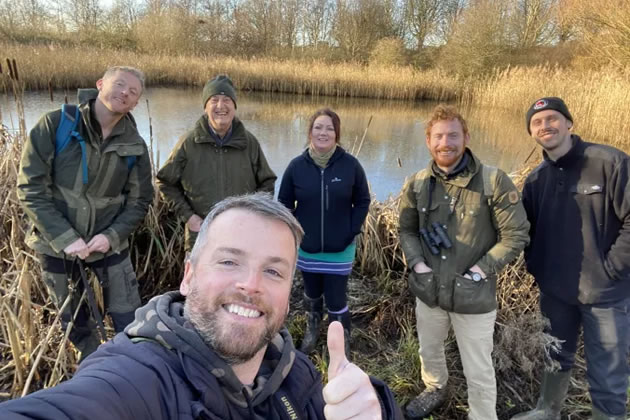Plans Made To Reintroduce Beavers into Greenford
Animals could be released onto Paradise Fields

Left to right: Jon Staples (Ealing park ranger), Martin Smith (Friends of Horsenden Hill), Sean McCormack (Ealing Wildlife Group & London Beaver Working Group), Róisín Campbell-Palmer (Beaver Trust), Elliot Newton (Citizen Zoo & London Beaver Working Group), Ben Stockwell (Citizen Zoo & London Beaver Working Group). Picture: Ealing Wildlife Group
Beavers could be reintroduced into a Greenford if plans are approved by the government.
Under the moves by the Ealing Beaver Reintroduction Project, at least two of the large mammals could be released onto Paradise Fields in Greenford as early as next year.
The plan in collaboration with Ealing Council is being led by community groups Ealing Wildlife Group, Friends of Horsenden Hill and Citizen Zoo.
To get the reintroduction off the ground, project leaders must first apply for a licence from government body Natural England.
Speaking to the Local Democracy Reporting Service, Ealing Wildlife Group founder Sean McCormack explained that project’s aims were to improve biodiversity and educate the public.
He said, “The justifications for applying for the licence are we can study water quality, flow rate and flood alleviation, and [improve] habitat and biodiversity.
“The other reason is about public engagement with rewilding ecosystem services and nature-based solutions to problems.”
According to Sean, 38, contrary to what many people think, beavers can help reduce the risk of flooding because their dams slow the rate at which water flows into rivers during heavy rainfall.
One of the project’s aims will be to study whether the beavers can help cut out flooding in key areas of Greenford.
If the plan goes ahead, the beavers would be brought down from Scotland and released into Greenford.
Paradise Fields would be enclosed to house the beavers but Sean said the site would still be open to the public to walk through and project leaders plan to run educational tours.
He added the beavers were unlikely to be disturbed by people because they are nocturnal and build their homes, called lodges, on water.
Sean said, “We have to remember that actually, everything a beaver does is designed to protect it from potential predators or disturbance.
“So even if people want to get close to them, they are not going to be able to, because beavers will create dams to protect themselves.”
Beavers are a native British species hunted to extinction in the 16th century for their fur and meat.
The Ealing Wildlife Group is currently conducting a public consultation survey to hear from residents who might have concerns or questions.
Chair of the Friends of Horsenden Hill Martin Smith said, “It’s an exciting project and it’s early days but the signs are promising.”
Beavers were brought back to London for the first time in more than 400 years just last week. Two of them were released into an enclosure in the grounds of a farm in Enfield on Thursday March 17.
Natural England, Ealing Wildlife Group and Citizen Zoo have been approached for comment.
Ealing Wildlife Group is involved in a number of conservation projects and is always keen to hear from anyone who would like to volunteer.
Lisa Haseldine - Local Democracy Reporter
March 29, 2022